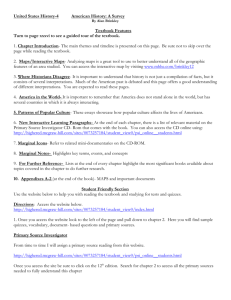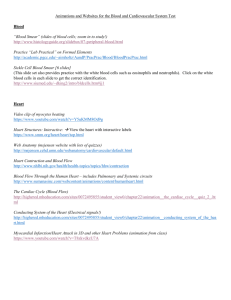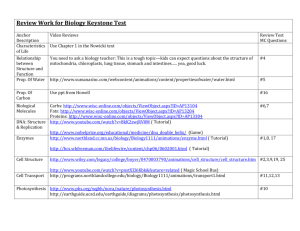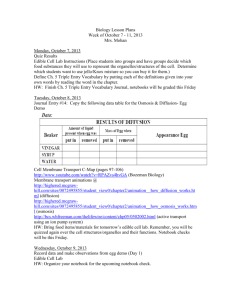Course Objectives
advertisement
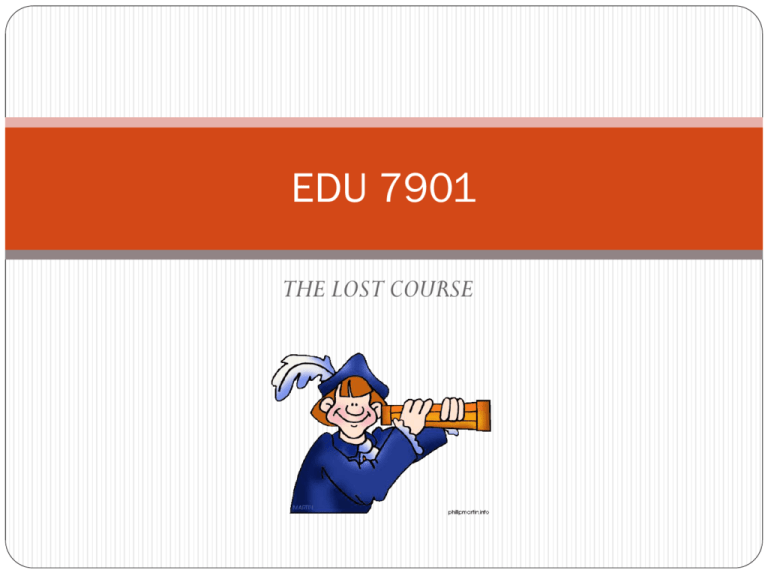
EDU 7901 THE LOST COURSE FRIDAY, FEBRUARY 8, 2013 ---- NOW MARCH 8, 2013 GOALS:1. Meet and Greet bernator@stjohns.edu rbernato@gmail.com --- ONLY IN EMERGENCY 6318480316 6312187709 Housekeeping HOURS 3/8 5-9 3/9 9-5 3/10 9-5 HOUSEKEEPING 3/17 9-5 WIN-WINS RE 3/17 RUN CLASS AS PROPOSED SET UP ALTERNATIVE CLASS MEET DATES FACE TO FACE MOODLE YOU CONSTRUCT THIS WITH ME BLACKBOARD CHAT YOU CONSTRUCT THIS WITH ME FACETIME SKYPE COMBINATIONS THEREOF? MY NON-NEGOTIABLES WE HAVE TO SATISFY THE TIME REQUIREMENT I CANNOT INTERACT FROM 3-23 TO 3/29 PRETTY MUCH OPEN AFTER THAT Decide By the end of this weekend Syllabus Course Objectives: In this course we examine guidelines for research design in education and issues related to research design. The objectives are accomplished through reading texts on research design, reflective articles, published research studies, and a practical assignment where individuals engage in the design of a research study. http://spring13edd.pbworks.com/w/page/62944720/Sylla bus Assignments ARTICLE ANALYSES OF 4 ARTICLES (AS ASSIGNED) (TYPED) ARTICLES ONE AND TWO DUE FEBRUARY 23 Copland, M. A. (2000). Problem-based learning and prospective principals’ problem framing ability. Educational Administration Quarterly, 36(4), 585607. Marschall, M. (2006). Parent involvement and educational outcomes for Latino students. Review of Policy Research, 23(5), 1053-1076. Assignments ARTICLES THREE AND FOUR DUE MARCH 23 Sirin, S. (2005). Socioeconomic status and academic achievement: A meta-analytic review of the research. Review of Educational Research, 75, 417-453. Dixon, L. Q., Zhao, J., Shin, J., Wu, S., Su, J, BugessBrigham, R., Gezer, M. U., & Snow, C. (2012). What we know about second language acquisition: A synthesis from four perspectives. Review of Educational Research, 82(1), 5-60. Guidelines The extent to which the author(S) develop a cogent rationale for the subject they are exploring How clearly the author(S) have framed their problem statement and research question(s). How clearly the author(S) have linked the dimensions above to relevant empirical research How the method(s) the author(S) have used appear validly suited to answer their research questions How clearly the author(S) have demonstrated their data analyses and have linked these to the problem statement and / or research questions The depth to which the author(S) conclusions and recommendations appear valid insofar as the data may suggest. Your own recommendations about this particular research might be expanded, improved, and / or updated. Assignments – Mini Study (a) Research Questions & Hypotheses; Variables (Independent and Dependent) with levels (IVs) and operational definitions (DVs) (10 pts.) (b) Target Population and Sample for study description with relevant demographic information (5 pts.) (c) Instrumentation (one to be constructed or selected) with Reliability and Validity information (15 pts.) (d) Procedures & Research Design (10 pts.) (e) Review of Literature (appx. 5-6 relevant citations summarized) (20 pts.) (f) Data Analysis and Results (20 pts.) (g) Conclusions and Discussion with limitations of the study (10 pts.) Presentation of Study to class (10 pts.) Final APA style paper (use outline provided on page 6 and sample) (10 pts.) Dissertation Draft Using the preparation for dissertation guide that Dr. Hughes has distributed, rough draft develop your tentative dissertation with the full understanding that your actual three chapter proposal is always finally subject to you and your Mentor’s guidance and development. PBWORKS Pbworks.com Spring13edd Purpose(s) Content vs. Process Differentiate among forms of Educational Research – 15 minutes a. P. 20 – IT ISN’T LINEAR AND IT ISN’T NEATb. http://www.edpsycinteractive.org/topic s/intro/research.htmlc. P. 23 # 2 –WHAT DO YOU THINK? D. P. 24 – GET A BASELINE 9. Practice and Writing Research Questions – 45 minutes ONLINE 2.1-2.5 http://highered.mcgraw- hill.com/sites/0078097851/student_view0/chapter2/interact ive_activities.html# P.35 http://www.theresearchassistant.com/tutorial Identify and Assess Variables Hypotheses Chapter 5 http://allpsych.com/researchmethods/variables.html http://www.socialresearchmethods.net/kb/hypothes.htm ONLINE 5.1; 5.3; 5.4; 5.5; 5.6 http://highered.mcgraw- hill.com/sites/0078097851/student_view0/chapter5/interact ive_activities.html# P.87 – point out P.89 – mini study and/or diss Assess sampling protocols http://www.gifted.uconn.edu/siegle/research/Samples/instr uctornotessamples.htm http://www.socialresearchmethods.net/kb/sampling.htm ONLINE 6.1; 6.2; 6.5; 6.6 http://highered.mcgrawhill.com/sites/0078097851/student_view0/chapter6/interact ive_activities.html# P.106-107 - review P.109 – model http://cie.asu.edu/volume6/number11/ - analyze for all points Identify Descriptive Statistics http://highered.mcgraw- hill.com/sites/0078097851/student_view0/chapter10/main_ points.html http://davidmlane.com/hyperstat/index.html http://onlinestatbook.com/stat_sim/sampling_dist/index.ht ml ONLINE 10.1-10.12 http://highered.mcgrawhill.com/sites/0078097851/student_view0/chapter10/interac tive_activities.html# SPSS - DEMONSTRATE P.218 – http://cie.asu.edu/volume6/number11/ Frame out Mini – Study Saturday Identify inferential statistics http://highered.mcgraw- hill.com/sites/0078097851/student_view0/chapter11/main_ points.html http://highered.mcgrawhill.com/sites/0078097851/student_view0/chapter11/key_te rms.html http://davidmlane.com/hyperstat/logic_hypothesis.html http://www.statsoft.com/textbook/nonparametric-statistics/ http://davidmlane.com/hyperstat/intro_ANOVA.html http://www.ruf.rice.edu/~lane/case_studies/instructor_rep utation/index.html -WALK THROUGH T TEST ONLINE 11.1-11.6 – 1,2,4,6 Table 11.2 - SAMPLING ERROR P.244 – Evaluate Instrumentation Chapter 7 http://highered.mcgraw hill.com/sites/0078097851/student_view0/chapter7/main_points.html http://highered.mcgrawhill.com/sites/0078097851/student_view0/chapter7/key_terms.html http://www.wmich.edu/evalctr/checklists/about-checklists/ http://pareonline.net/getvn.asp?v=5&n=12 http://ncme.org http://highered.mcgraw- hill.com/sites/0078097851/student_view0/chapter7/problem_sheets.html ONLINE 7.1-7.6 - http://highered.mcgraw hill.com/sites/0078097851/student_view0/chapter7/interactive_activities.html P. 114 - REVIEW 7.1 – POINT OUT NOIR – 137 FF. WHAT IND OF DATA DOES THE INSTRUMENT GIVE YOU? P.145 Summarize validity and reliability CHAPTER 8 http://highered.mcgraw- hill.com/sites/0078097851/student_view0/chapter8/main_p oints.html http://highered.mcgrawhill.com/sites/0078097851/student_view0/chapter8/key_ter ms.html http://allpsych.com/researchmethods/validityreliability.html ONLINE 8.1-8.3 - http://highered.mcgrawhill.com/sites/0078097851/student_view0/chapter8/interact ive_activities.html# SPSS – MODEL http://www.slideshare.net/edithosb/reliability-and-validity Identify and assess variables and hypotheses – Differentiate between internal and external validity http://highered.mcgraw- hill.com/sites/0078097851/student_view0/chapter9/main_p oints.html http://highered.mcgrawhill.com/sites/0078097851/student_view0/chapter9/key_ter ms.html CHAPTER 9 ONLINE 9.3 - http://highered.mcgraw- hill.com/sites/0078097851/student_view0/chapter9/i nteractive_activities.html# Assess quantitative statistical analysis CHAPTER 12 http://highered.mcgraw- hill.com/sites/0078097851/student_view0/chapter12/main_ points.html http://highered.mcgrawhill.com/sites/0078097851/student_view0/chapter12/key_te rms.html ONLINE - http://highered.mcgrawhill.com/sites/0078097851/student_view0/chapter12/interac tive_activities.html# Assess experimental research CHAPTER 13 http://highered.mcgraw- hill.com/sites/0078097851/student_view0/chapter13/main_ points.html http://highered.mcgrawhill.com/sites/0078097851/student_view0/chapter13/key_te rms.html P. 286 ff. - ANALYZE ONLINE 13.1 – 13.2 http://highered.mcgrawhill.com/sites/0078097851/student_view0/chapter13/interac tive_activities.html# Mastering principles of reviewing literature CHAPTER 3 http://highered.mcgraw- hill.com/sites/0078097851/student_view0/chapter3/main_p oints.html http://highered.mcgrawhill.com/sites/0078097851/student_view0/chapter3/key_ter ms.html http://highered.mcgrawhill.com/sites/0078097851/student_view0/chapter3/proble m_sheets.html Library models Applying correlational research Chapter 15 http://highered.mcgraw- hill.com/sites/0078097851/student_view0/chapter15/main_ points.html http://highered.mcgrawhill.com/sites/0078097851/student_view0/chapter15/key_te rms.html http://www.surveysystem.com/correlation.htm http://www.socialresearchmethods.net/kb/statcorr.htm ONLINE 15.1-15.8 1-3 338-340 - model Applying causal – comparative research Chapter 16 http://highered.mcgrawhill.com/sites/0078097851/student_view0/chapter16/main_points.html https://www.mtholyoke.edu/courses/bpackard/stats/p201_ch8/index.htm ONLINE 16.1; 16.4 Sunday 9-5 Dissertation Madness Applying Ethical Issues to Research CHAPTER 4 ONLINE 8.1-8.3 OR WE WORK INSIDE OUT? FRIDAY Assess study articles SATURDAY Assess / Exchange Mini Studies Draft SUNDAY Assess / Exchange Dissertation Drafts Plusses Minuses QUALITATIVE MIXED METHODS
